| Srl | Item |
| 1 |
ID:
151753
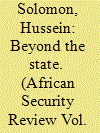

|
|
|
|
|
| Summary/Abstract |
Confronted with myriad security challenges, African states and the much-vaunted peace and security architecture of the African Union (AU) has proven not to be up to the challenge. Indeed, this is implicitly acknowledged by the AU itself if one considers the creation of such security structures as the African Mission in Somalia (AMISOM), which exists outside its peace and security architecture. This paper argues for a radical rethink of security structures on the African continent – one in which state structures of security coexist with newer forms of security actors, including private military companies (PMCs), community movements and the business sector. Whilst this shift in security actors is already happening on the ground, policymakers need to embrace this new reality.
|
|
|
|
|
|
|
|
|
|
|
|
|
|
|
|
| 2 |
ID:
129500
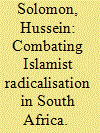

|
|
|
|
|
| Publication |
2014.
|
| Summary/Abstract |
Is radical Islamism spreading in South Africa? The answer has to be an emphatic 'yes'. When discussing issues of radicalisation in Africa, commentators often examine the case of Somalia's al-Shabaab or al-Qaeda's North African franchise, al-Qaeda in the Islamic Maghreb (AQIM). Very little attention is paid to radicalisation amongst South Africa's Muslim population. Yet, there is growing evidence that South Africa has come to play an important role in global jihadi networks, from the provision of safehouses and identity documents to the movement of funds and the existence of paramilitary camps for local and foreign jihadis. This paper aims to briefly examine radicalisation and its attendant sources in the country, as well as seeking ways to combat it utilising lessons learned from other countries. 'Institutional socialisation' by means of the sources of radicalisation, as well as the concept of what could be termed 'the democratisation of jihad' are discussed. The author also proposes ways to combat radicalisation in South Africa utilising lessons learned from other countries, concluding that issues of radicalisation and deradicalisation have to be dealt with on the part of both government and the South African Muslim community.
|
|
|
|
|
|
|
|
|
|
|
|
|
|
|
|
| 3 |
ID:
114421
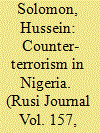

|
|
|
|
|
| Publication |
2012.
|
| Summary/Abstract |
Nigerian terrorist group Boko Haram has gained increased media attention over the past few years: as the violence, frequency and scope of its attacks continue to increase, the counter-terrorist policies adopted by the Nigerian government are proving ineffective, if not counterproductive. Hussein Solomon dissects the increasing sophistication of Boko Haram and highlights the root causes of the Jonathan administration's failure to devise and implement a successful approach to counter-terrorism.
|
|
|
|
|
|
|
|
|
|
|
|
|
|
|
|
| 4 |
ID:
087422
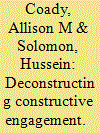

|
|
|
| 5 |
ID:
111539
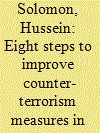

|
|
|
|
|
| Publication |
2012.
|
| Summary/Abstract |
In recent years, South Africa has come to be used by international terrorists as a safe house, for paramilitary training purposes, as a base from which to plan attacks on other countries and as a conduit for financial transactions. South Africa's own counter-terrorism initiatives have been labelled 'reactive' by analysts. Indeed, the existing counter-terrorism regime suffers from a lack of political will to issues of corruption and ineptitude bedevilling the security apparatus of the state. However, using lessons learned from other countries, Pretoria can yet turn the tide against international terrorism by adopting more pro-active measures and by undertaking steps aimed at the depoliticisation and decriminalisation of the security forces.
|
|
|
|
|
|
|
|
|
|
|
|
|
|
|
|
| 6 |
ID:
006864
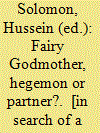

|
|
|
|
|
| Publication |
South Africa, Institute for Security Studies, 1997.
|
| Description |
73p.
|
| Series |
ISS monograph series; no.13
|
|
|
|
|
|
|
|
|
|
|
|
Copies: C:1/I:0,R:0,Q:0
Circulation
| Accession# | Call# | Current Location | Status | Policy | Location |
| 038835 | 327.68/SOL 038835 | Main | On Shelf | General | |
|
|
|
|
| 7 |
ID:
064905
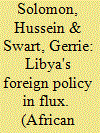

|
|
|
| 8 |
ID:
122228
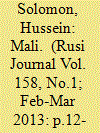

|
|
|
|
|
| Publication |
2013.
|
| Summary/Abstract |
For over a decade Mali has been viewed as a poster child of good governance, secularism and tolerance and as a bulwark against radical Islam. Yet three inter-related sources of insecurity - Tuareg nationalism, the rise of Islamism and the nature of Mali's post-independence state - coalesced to bring about a takeover of northern Mali by Islamist forces. The rise of the Islamists, in turn, prompted Western - predominantly French - and regional intervention. Looking beyond the current intervention, Hussein Solomon argues that only a more holistic approach can prevent a repeat of this tragedy.
|
|
|
|
|
|
|
|
|
|
|
|
|
|
|
|
| 9 |
ID:
138042
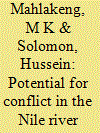

|
|
|
|
|
| Summary/Abstract |
Since the end of the twentieth century, the realm of international relations has been characterised by resource geopolitics - the potential for conflict as a result of the scarcity of vital resources that cross political boundaries.
|
|
|
|
|
|
|
|
|
|
|
|
|
|
|
|
| 10 |
ID:
086214
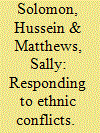

|
|
|
|
|
| Publication |
2009.
|
| Summary/Abstract |
From Chiapas in Mexico to Chechnya in the Russian federatio, from India to Indonesia and from Algeria and Angola to Afghanistan, the world is witnessing a return to the "cult of origin" where difference often means destruction, destitution, despair and death.
|
|
|
|
|
|
|
|
|
|
|
|
|
|
|
|
| 11 |
ID:
006896
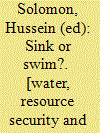

|
|
|
|
|
| Publication |
South Africa, Institute for Defence Policy, 1996.
|
| Description |
698p.
|
| Series |
IDP monograph series; 6
|
|
|
|
|
|
|
|
|
|
|
|
Copies: C:1/I:0,R:0,Q:0
Circulation
| Accession# | Call# | Current Location | Status | Policy | Location |
| 038738 | 333.910968/SOL 038738 | Main | On Shelf | General | |
|
|
|
|
| 12 |
ID:
066952
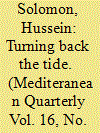

|
|
|